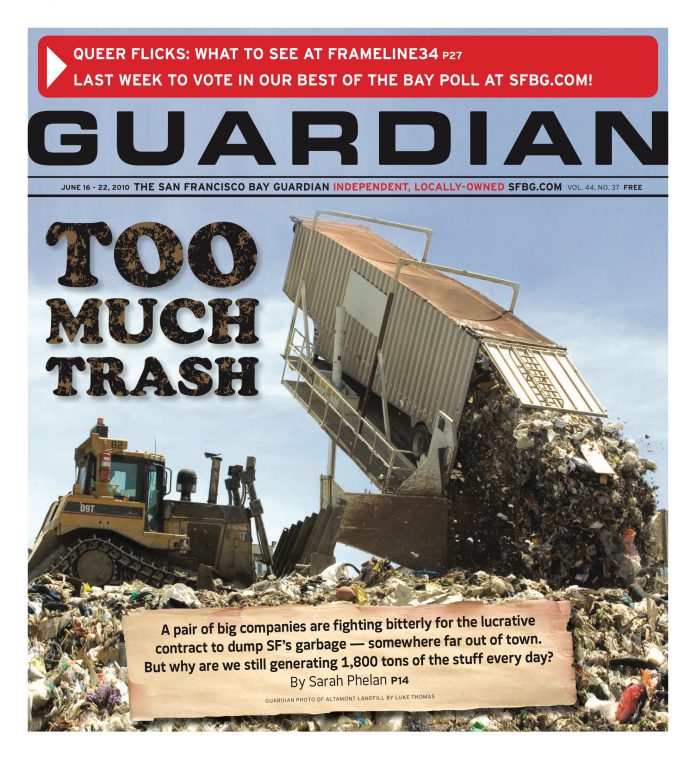tredmond@sfbg.com
The California Court of Appeal heard oral arguments on the Guardian’s lawsuit against SF Weekly and its chain parent June 11, and the discussion focused almost entirely on the Weekly’s assertion that it’s too easy to prove predatory pricing under California’s Unfair Practices Act.
Justices James J. Marchiano, Sandra L. Margulies, and Robert L. Dondero peppered the Weekly’s lawyer, Dennis Maio, with questions as he attempted to argue that state law needed to be brought in line with federal standards.
The Unfair Practices Act bars companies from selling products below costs with the aim of harming a competitor. The Guardian sued the Weekly and its parent company, New Times, under that statute, claiming that the chain had deliberately sold ads below cost with the aim of driving a smaller, locally-owned competitor out of business.
In March 2008, a San Francisco jury found in favor of the Guardian and awarded more than $6 million in damages. Judge Marla Miller trebled some of the damages, and with attorney’s fees and interest, the judgment is now close to $23 million.
Maio argued that the intent of the law was to protect consumers, and that below-cost sales are often beneficial. “Low prices are good,” he said. “Below-cost prices are even better, because they’re cheaper.” He compared the Village Voice Media chain, which owns SF Weekly, to Costco, suggesting that the justices might shop there for better prices.
The thrust of Maio’s claim — and the heart of the Weekly’s appeal — is the argument that the Weekly shouldn’t have been held liable for predatory pricing unless the Guardian could prove that the chain would be able to recoup its losses after its competitor was gone. The federal courts have adopted that approach — and the result has been the effective end of predatory pricing suits in federal court.
But there’s nothing in California law that requires so-called “recoupment” proof, and the justices focused on that in their questions to Maio.
Maio argued that antitrust law was all about protecting consumers, and that the only danger of below-cost sales is if they lead to higher prices later, when a monopoly company has driven away competitors. “Causing a competitor to lose money isn’t a violation,” he said. “The purpose of the statute is to protect the public.”
Under questioning, Milo admitted that there’s no mention of recoupment in the Unfair Practices Act, and no discussion of it in the legislative history.
In a somewhat bizarre diversion, Maio tried to argue that the UPA had anti-Semitic roots because it could have been devised to hurt Jewish-owned chain stores. Then he compared below-cost pricing to pro bono legal work — although it’s hard to make any rational argument that SF Weekly owners were attempting to do a charitable act by putting the Guardian out of business.
Ralph Alldredge argued the Guardian’s case. “This is,” he said, “a plain and simple matter of statutory interpretation.
“This is black-letter law,” Alldredge continued. “You can’t take the preamble to a law and use it to add things that aren’t there — especially to add things that are completely inconsistent with the terms of the statute.”
When Dondero asked why there are so few cases under the California Unfair Practices Act, Alldredge explained that until 1987, federal antitrust law took the same approach as the state, so most cases went to federal court. The federal judges added the recoupment standard — “and essentially closed the door to these cases,” Alldredge said.
“And that’s what they’re asking this court to do.”
Alldredge pointed to a number of cases where state antitrust law goes beyond federal law. He also said that the standard or proving below-cost sales and intent to harm a competitor has been tested in other cases “and the Unfair Practices Act has sailed through all those tests.”
Maio then tried to bring up the issue of whether New Times, now part of Village Voice Media, could be held liable for the actions of the Weekly, but the justices cut him off, saying they’d already read all the relevant briefs and testimony.
A ruling is expected in several weeks.
VVM’s Executive Associate Editor Andy Van De Voorde, whose coverage of the trial has been nasty, bitter, and personal, took a remarkably muted approach to the Court of Appeal hearing. The Chronicle’s Bob Egelko turned in a typically clean, accurate account of the proceedings.

